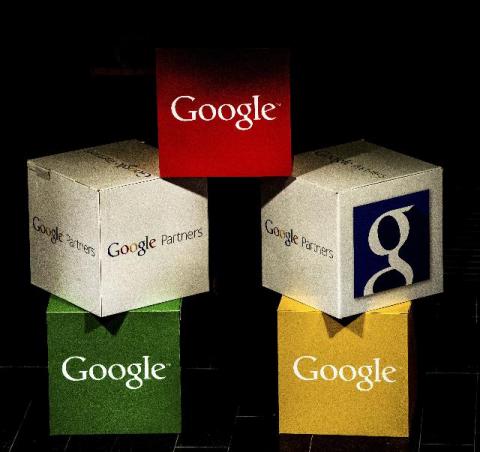Google Is Now Alphabet, And That Could Spell Big Things For Health Care

Google is renaming itself Alphabet, and splitting into multiple companies. (DENIS CHARLET/AFP/Getty Images)
Dan Diamond
If you’re searching for reasons why Google has renamed itself Alphabet, here’s one: It positions the tech company to expand into health care, which could be very healthy for its long-term fortunes.
Google’s health care ambitions are no secret. In the past year alone, the company has teased a pill that would detect cancer, debuted a plan to map all the biomarkers in the human body, and reminded the media of a half-dozen other wild inventions that could change health care forever.
Just one small challenge: None of those inventions are ready for prime time. They’re probably not even ready for naptime, if Google executives are being honest.
But shifting from Google to Alphabet could catalyze a new wave of product development.
And to understand why, it’s important to first understand how a holding company like Alphabet works.
How a Holding Company Like Alphabet Will Work
As my colleagues at the Advisory Board Company, Ben Umansky and Tom Cassels, recently explained, the goal of a holding company is to empower the individual business units and maximize their performance.
A holding company model is especially useful when the original organization grows so big and complex — like Google — that its different units may not be organically aligned.
(The holding company model is actually in vogue in health care right now, as executives attempt to grapple with their ever-expanding health systems; Ascension Health, the nation’s largest not-for-profit hospital chain, adopted a holding company model in 2012.)
And by splitting up Google’s diverse portfolio, Alphabet’s leaders are incenting its half-dozen or so spinoff companies to pay more attention to their bottom lines.
While the new batch of standalone companies will still be funded by Google’s billions, at least to start, the Alphabet firms won’t have the protection of being in-house start-ups anymore. Their individual financial performance may not be public, but it will become much easier for speculators to get a sense for how they’re doing.
And by needing to be staked — “We will rigorously handle capital allocation and work to make sure each business is executing well,” writes Google CEO-turned-Alphabet CEO Larry Page — it will put more pressure on the Alphabet firms to produce, or potentially become acquisition targets.
To Start, Alphabet Will Include Many of Google’s Health Care Ventures
Alphabet will have a strong heath care focus initially. For evidence, look no further than Page’s announcement memo, where he touts…
Calico: This biotech company, headed by the former CEO of Genentech, is researching the biology of aging and has already committed hundreds of millions of dollars to a new research facility.
Life Sciences: This wing of Google is working with Novartis to develop smart contact lenses to monitor bodily functions, such as blood sugar levels, via miniscule sensors.
Google Ventures: While Google’s hedge fund invested only 9% of its funds in 2012 and 2013 in health care companies, about 36% of its dollars went toward health care in 2014. As FORBES’s Matthew Herper reported on Monday, the fund just invested in the new CRISPR gene-editing platform, which is intended to enable scientists to easily cut-and-paste DNA.
Google X: Many of the Google X ventures are especially ambitious, like its self-driving cars or balloons designed to deliver Internet around the world. But the firm is grounded enough to get top-tier talent: Google X just poached a well-regarded cardiologist from Harvard to head up its Baseline Study into the human body.
As you may have noticed from that list, Google’s already been going for “moonshots” —transformative products that are the business equivalent of landing a spaceship on the moon.
And while many of its moonshots projects have failed so far, business journalist Felix Salmon fishes out a connection between Google’s most ambitious team and this new, bold strategy for the entire company.
“In many ways Google X is the tail wagging the Google dog,” Salmon writes at Fusion. The incredible aspirations of Google X “more or less epitomizes the thinking behind the entire Alphabet project.”
You can also see that long-term thinking manifest as Google ramps up its investments in health care.
“Google is trying to buy into technology that’s changing older industries and suits its big data expertise,” Flatiron CEO Nat Turner told the Wall Street Journal last year. (Google Ventures invested more than $100 million in Flatiron, a startup that analyzes cancer data.) “Health care is one of the only industries that haven’t been disrupted a lot by technology yet.”
Of course, Google has been a dominant company for years. It’s one of the largest organizations in the world. FORBES ranked them #39 on its most recent list of the Global 2000.
And Search is a big, multi-billion-dollar business now.
But Google faces potential disruptions — for example, Google’s revenues are extremely dependent on its relationship with Apple — and there are questions over what the Search business model will look like as mobile devices evolve.
Meanwhile, health care is a multi-trillion-dollar business. Health care will stay a multi-trillion-dollar business for years to come.
Can Google win a share of the industry? It’s too soon to say, but the dramatic move to remake its business model has certainly strengthened its hand. And based on the Alphabet companies’ ambitions, it might spell big things for patients, too.
Source: Forbes
